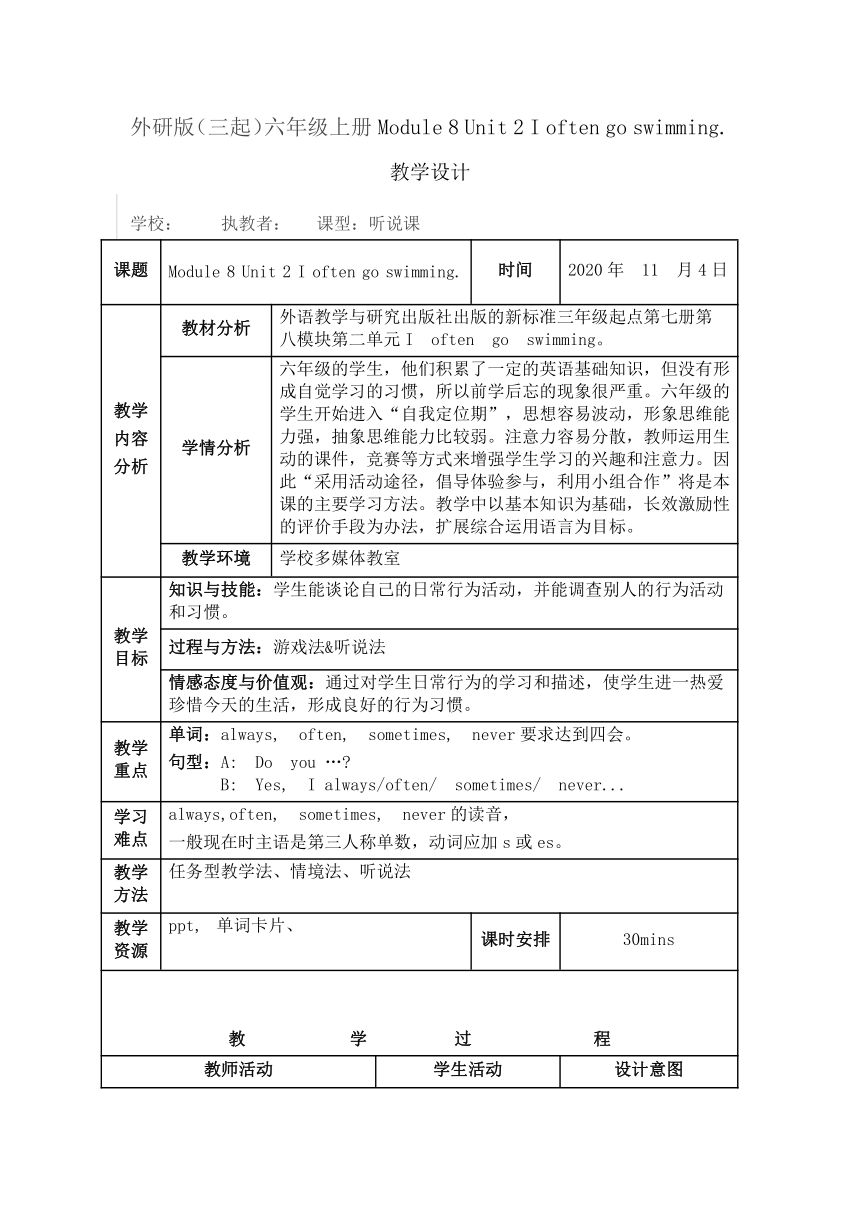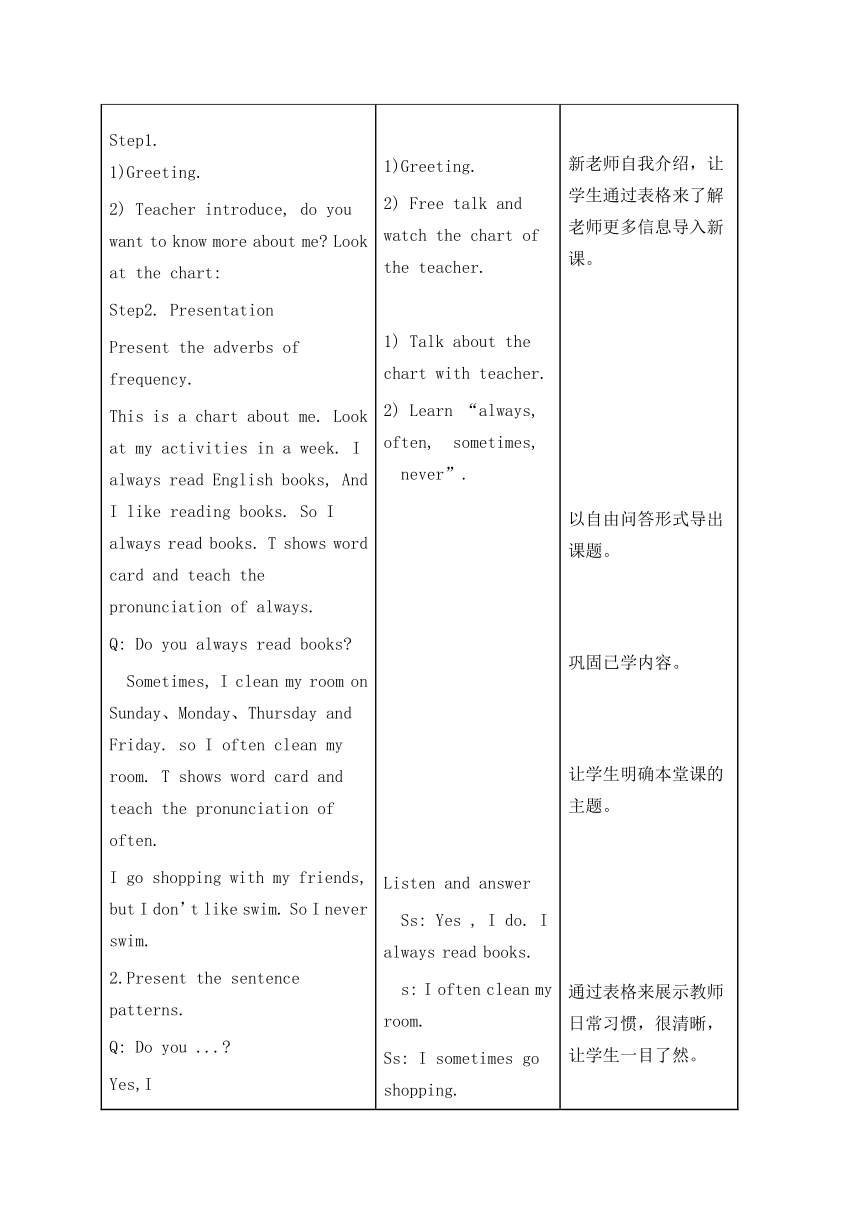Module 8 Unit 2 I often go swimming.教案
文档属性
| 名称 | Module 8 Unit 2 I often go swimming.教案 |

|
|
| 格式 | docx | ||
| 文件大小 | 23.3KB | ||
| 资源类型 | 教案 | ||
| 版本资源 | 外研版(三年级起点) | ||
| 科目 | 英语 | ||
| 更新时间 | 2021-04-24 00:00:00 | ||
图片预览


文档简介
外研版(三起)六年级上册Module 8 Unit 2 I often go swimming.
教学设计
学校: 执教者: 课型:听说课
课题
Module 8 Unit 2 I often go swimming.
时间
2020年?11?月4日
教学
内容
分析
教材分析
外语教学与研究出版社出版的新标准三年级起点第七册第八模块第二单元I?often?go?swimming。
学情分析
六年级的学生,他们积累了一定的英语基础知识,但没有形成自觉学习的习惯,所以前学后忘的现象很严重。六年级的学生开始进入“自我定位期”,思想容易波动,形象思维能力强,抽象思维能力比较弱。注意力容易分散,教师运用生动的课件,竞赛等方式来增强学生学习的兴趣和注意力。因此“采用活动途径,倡导体验参与,利用小组合作”将是本课的主要学习方法。教学中以基本知识为基础,长效激励性的评价手段为办法,扩展综合运用语言为目标。
教学环境
学校多媒体教室
教学目标
知识与技能:学生能谈论自己的日常行为活动,并能调查别人的行为活动和习惯。
过程与方法:游戏法&听说法
情感态度与价值观:通过对学生日常行为的学习和描述,使学生进一热爱珍惜今天的生活,形成良好的行为习惯。
教学重点
单词:always,?often,?sometimes,?never要求达到四会。
句型:A:?Do?you …?
B:?Yes,?I always/often/?sometimes/?never...?
学习难点
always,often,?sometimes,?never的读音,
一般现在时主语是第三人称单数,动词应加s或es。
教学方法
任务型教学法、情境法、听说法
教学资源
ppt,?单词卡片、
课时安排
30mins
教??????学?????过???????程
教师活动
学生活动
设计意图
Step1.
1)Greeting.
2) Teacher introduce, do you want to know more about me? Look at the chart:
Step2. Presentation
Present the adverbs of frequency.
This is a chart about me. Look at my activities in a week. I always read English books, And I like reading books. So I always read books. T shows word card and teach the pronunciation of always.
Q: Do you always read books?
?Sometimes, I clean my room on Sunday、Monday、Thursday and Friday. so I often clean my room. T shows word card and teach the pronunciation of often.
I go shopping with my friends, but I don’t like swim. So I never swim.
2.Present the sentence patterns.
Q: Do you ...?
Yes,I always/often/sometimes...
No, I never.... ?
Summary:总结always,often,?sometimes,?never的用法。
Practice1:Acorrding to the chart ,and fill in the blanks with always/often/sometimes/never.
Practice2:Finish the listening materials of P48.
Step3 Consolidation
1. Listen to the tape and circle the adverbs “always, often,?sometimes,?never”.
2. Read by yourself.
3.Read and tick.
4. Check the answers by comparing the chart with the text.T emphasizes the third person singular.
5.Listen and repeat,and use the third person singular to describe the pupils.
Step 4 Emotion
Enjoy a chant.
2. Think and say “At home/school,( ) is always with you?”
3. Wherever you go, whatever you do, your family is always with you.
Step5 Homework.
Make sentences by using the “always, often,?sometimes,?never”.
?
1)Greeting.
2) Free talk and watch the chart of the teacher.
1) Talk about the chart with teacher.
2) Learn “always, often,?sometimes,?never”.
Listen and answer
?Ss: Yes , I do. I always read books.?
?s: I often clean my room.?
Ss: I sometimes go shopping.
?Ss: I never swim
.
Ss:Module 8 Unit 2 I often go swimming.
Ss read the chart.
Learn new word after T and do some practice such as read row by row, two by two, x-ray.
?Yes, I always read books.
Learn the pronunciation of never.
?Some Ss to present their answers.
?Listen to the tape carefully and finish the chart.
Listen again and check??answers carefully.
?Open the book, turn to page 47.
Ss read and mimic the tape.
?The whole class read together.
?
Ss chant always, should clap their hands.When they chant never,stand up. When they chant sometimes, clap their hands again.When they chant often, they have to sit down.
1.改写课文。把?Activitiy 2各句子的主语替换成三单,写在抄写本上。
2.背并默写always, often, sometimes, never及U2标题。
?
新老师自我介绍,让学生通过表格来了解老师更多信息导入新课。
?
?
?
?
?
?
以自由问答形式导出课题。
?
?
巩固已学内容。
?
?
让学生明确本堂课的主题。
?
?
?
?
通过表格来展示教师日常习惯,很清晰,让学生一目了然。
?
?
?
多种形式的操练让学生能更有效的学会新单词。
?
?把已学单词运用到句子里,以便学生更好地掌握新单词。
?用句子来巩固新单词。
?
再次以表格的形式展示日常行为,学生一边完成表格一边感知四个频率副词的差异。
?
帮助学生准确区分四个频率副词的频率大小。
?通过听力和说检测学生们三单的掌握情况。
?
?
锻炼学生的听力以及从听力文本中提炼关键信息的能力。
?
培养学生的语感以及对文本语音语调的模仿。
?
?
齐读可以让部分基础薄弱的学生有跟读的机会。
板书:
?
?
?
?
?
?
Module 8 Unit 2 I often go swimming.
?
Often,always,sometimes,never
A:Do you often/always/sometimes/never... ?
B:Yes, I always/often/sometimes/never... .
She/He always/often/sometimes/never... . /No, never.
教学设计
学校: 执教者: 课型:听说课
课题
Module 8 Unit 2 I often go swimming.
时间
2020年?11?月4日
教学
内容
分析
教材分析
外语教学与研究出版社出版的新标准三年级起点第七册第八模块第二单元I?often?go?swimming。
学情分析
六年级的学生,他们积累了一定的英语基础知识,但没有形成自觉学习的习惯,所以前学后忘的现象很严重。六年级的学生开始进入“自我定位期”,思想容易波动,形象思维能力强,抽象思维能力比较弱。注意力容易分散,教师运用生动的课件,竞赛等方式来增强学生学习的兴趣和注意力。因此“采用活动途径,倡导体验参与,利用小组合作”将是本课的主要学习方法。教学中以基本知识为基础,长效激励性的评价手段为办法,扩展综合运用语言为目标。
教学环境
学校多媒体教室
教学目标
知识与技能:学生能谈论自己的日常行为活动,并能调查别人的行为活动和习惯。
过程与方法:游戏法&听说法
情感态度与价值观:通过对学生日常行为的学习和描述,使学生进一热爱珍惜今天的生活,形成良好的行为习惯。
教学重点
单词:always,?often,?sometimes,?never要求达到四会。
句型:A:?Do?you …?
B:?Yes,?I always/often/?sometimes/?never...?
学习难点
always,often,?sometimes,?never的读音,
一般现在时主语是第三人称单数,动词应加s或es。
教学方法
任务型教学法、情境法、听说法
教学资源
ppt,?单词卡片、
课时安排
30mins
教??????学?????过???????程
教师活动
学生活动
设计意图
Step1.
1)Greeting.
2) Teacher introduce, do you want to know more about me? Look at the chart:
Step2. Presentation
Present the adverbs of frequency.
This is a chart about me. Look at my activities in a week. I always read English books, And I like reading books. So I always read books. T shows word card and teach the pronunciation of always.
Q: Do you always read books?
?Sometimes, I clean my room on Sunday、Monday、Thursday and Friday. so I often clean my room. T shows word card and teach the pronunciation of often.
I go shopping with my friends, but I don’t like swim. So I never swim.
2.Present the sentence patterns.
Q: Do you ...?
Yes,I always/often/sometimes...
No, I never.... ?
Summary:总结always,often,?sometimes,?never的用法。
Practice1:Acorrding to the chart ,and fill in the blanks with always/often/sometimes/never.
Practice2:Finish the listening materials of P48.
Step3 Consolidation
1. Listen to the tape and circle the adverbs “always, often,?sometimes,?never”.
2. Read by yourself.
3.Read and tick.
4. Check the answers by comparing the chart with the text.T emphasizes the third person singular.
5.Listen and repeat,and use the third person singular to describe the pupils.
Step 4 Emotion
Enjoy a chant.
2. Think and say “At home/school,( ) is always with you?”
3. Wherever you go, whatever you do, your family is always with you.
Step5 Homework.
Make sentences by using the “always, often,?sometimes,?never”.
?
1)Greeting.
2) Free talk and watch the chart of the teacher.
1) Talk about the chart with teacher.
2) Learn “always, often,?sometimes,?never”.
Listen and answer
?Ss: Yes , I do. I always read books.?
?s: I often clean my room.?
Ss: I sometimes go shopping.
?Ss: I never swim
.
Ss:Module 8 Unit 2 I often go swimming.
Ss read the chart.
Learn new word after T and do some practice such as read row by row, two by two, x-ray.
?Yes, I always read books.
Learn the pronunciation of never.
?Some Ss to present their answers.
?Listen to the tape carefully and finish the chart.
Listen again and check??answers carefully.
?Open the book, turn to page 47.
Ss read and mimic the tape.
?The whole class read together.
?
Ss chant always, should clap their hands.When they chant never,stand up. When they chant sometimes, clap their hands again.When they chant often, they have to sit down.
1.改写课文。把?Activitiy 2各句子的主语替换成三单,写在抄写本上。
2.背并默写always, often, sometimes, never及U2标题。
?
新老师自我介绍,让学生通过表格来了解老师更多信息导入新课。
?
?
?
?
?
?
以自由问答形式导出课题。
?
?
巩固已学内容。
?
?
让学生明确本堂课的主题。
?
?
?
?
通过表格来展示教师日常习惯,很清晰,让学生一目了然。
?
?
?
多种形式的操练让学生能更有效的学会新单词。
?
?把已学单词运用到句子里,以便学生更好地掌握新单词。
?用句子来巩固新单词。
?
再次以表格的形式展示日常行为,学生一边完成表格一边感知四个频率副词的差异。
?
帮助学生准确区分四个频率副词的频率大小。
?通过听力和说检测学生们三单的掌握情况。
?
?
锻炼学生的听力以及从听力文本中提炼关键信息的能力。
?
培养学生的语感以及对文本语音语调的模仿。
?
?
齐读可以让部分基础薄弱的学生有跟读的机会。
板书:
?
?
?
?
?
?
Module 8 Unit 2 I often go swimming.
?
Often,always,sometimes,never
A:Do you often/always/sometimes/never... ?
B:Yes, I always/often/sometimes/never... .
She/He always/often/sometimes/never... . /No, never.
同课章节目录
- Module 1
- Unit 1 It's more than twenty thousand kilometers l
- Unit 2 It's in the west.
- Module 2
- Unit 1 There's Chinese dancing.
- Unit 2 There are lots of beautiful lakes in China.
- Module 3
- Unit 1 Collecting stamps is my hobby.
- Unit 2 What's your hobby?
- Module 4
- Unit 1 Thanksgiving is my favourite festival.
- Unit 2 Our favourite festival is the Spring Festiv
- Module 5
- Unit 1 Can you be my Chinese pen friend?
- Unit 2 I can speak French.
- Module 6
- Unit 1 You've got a letter from New York.
- Unit 2 I've got a stamp from China.
- Module 7
- Unit 1 I don't believe it.
- Unit 2 Pandas love bamboo.
- Module 8
- Unit 1 Do you often play with dolls?
- Unit 2 I often go swimming.
- Module 9
- Unit 1 Do you want to visit the UN building?
- Unit 2 I want to go to Shanghai.
- Review Module
- Unit 1
- Unit 2
- Module 10
- Unit 1 Don't talk in the library.
- Unit 2 Go straight on!
